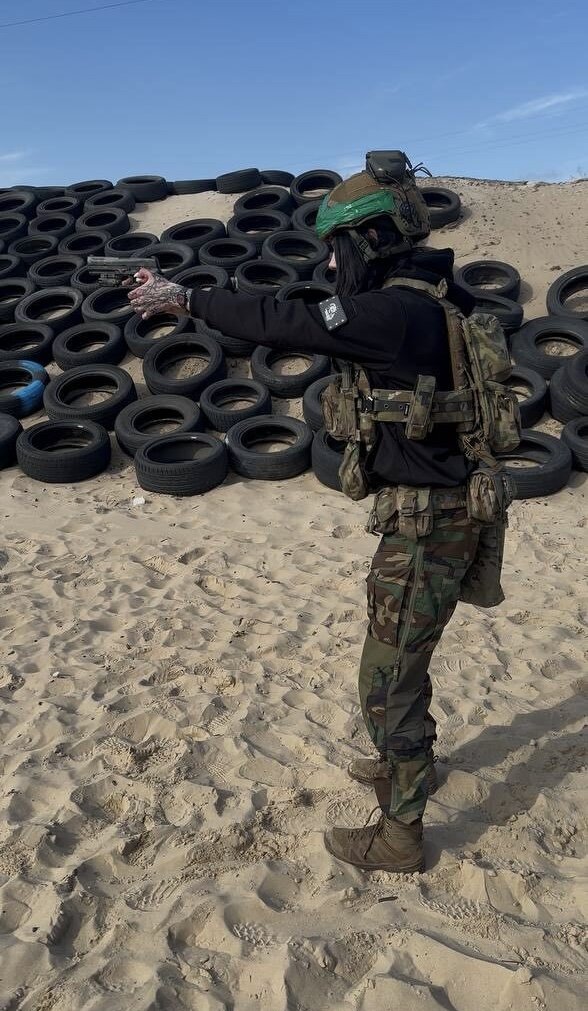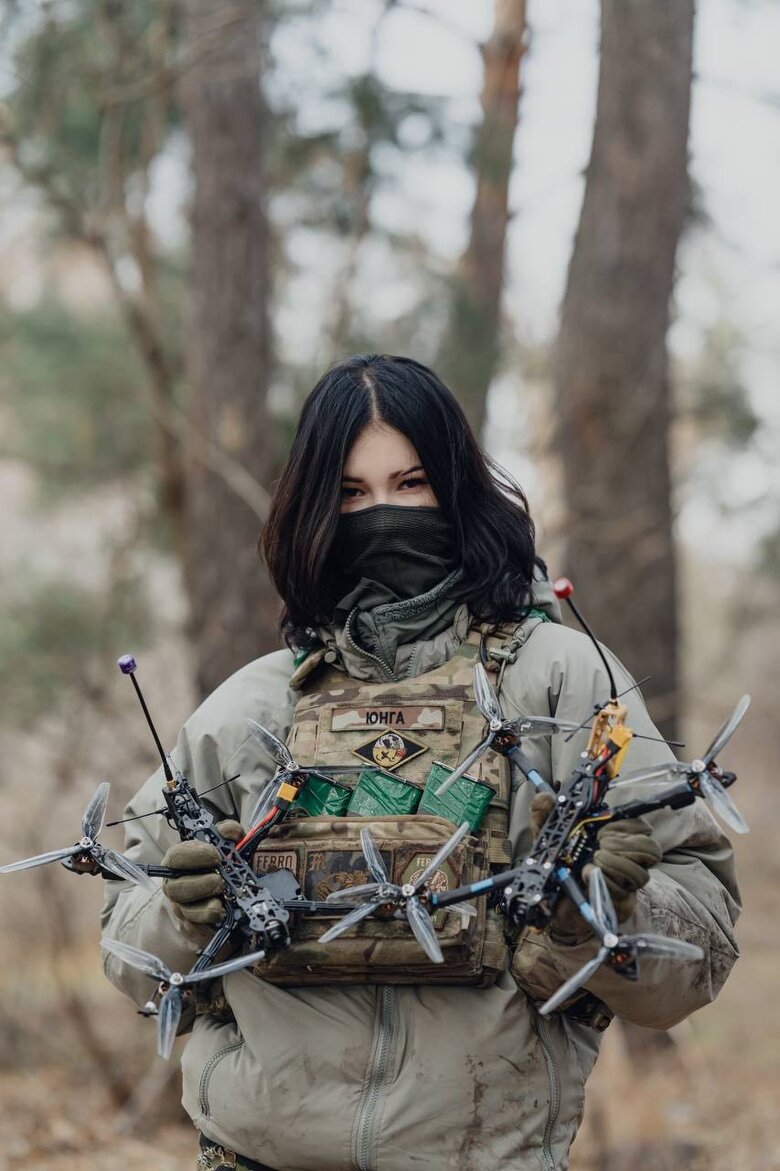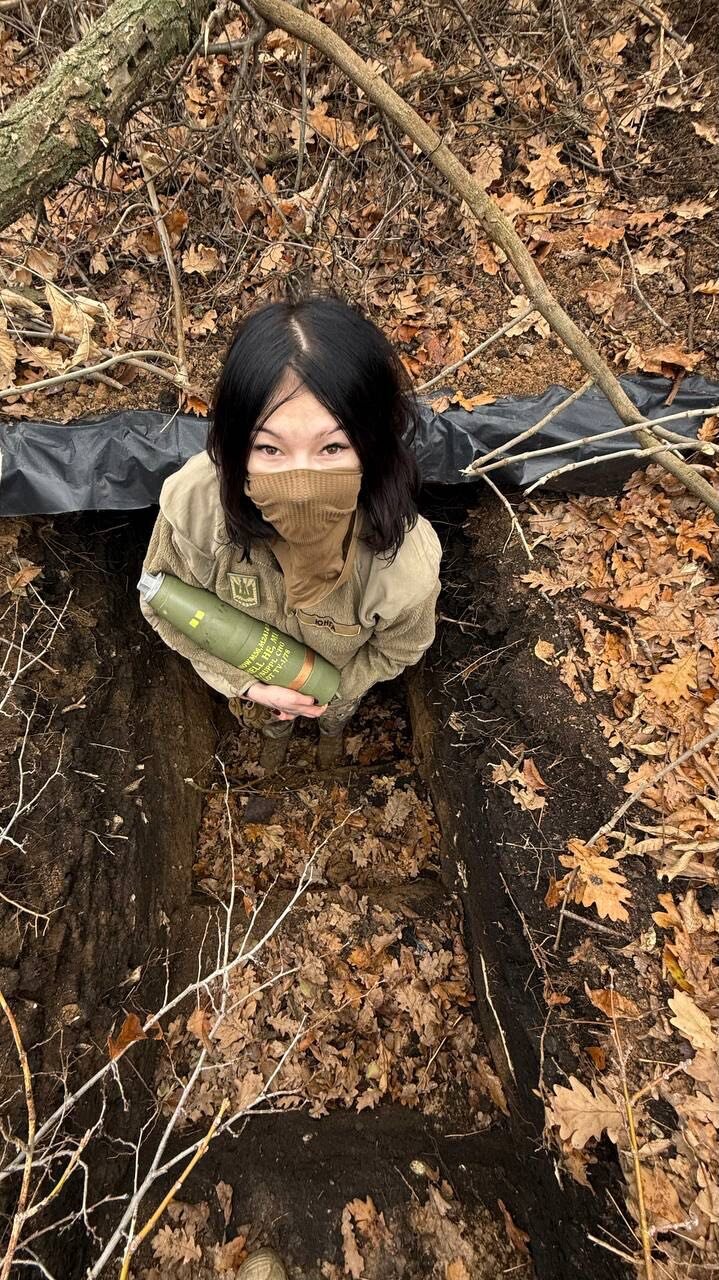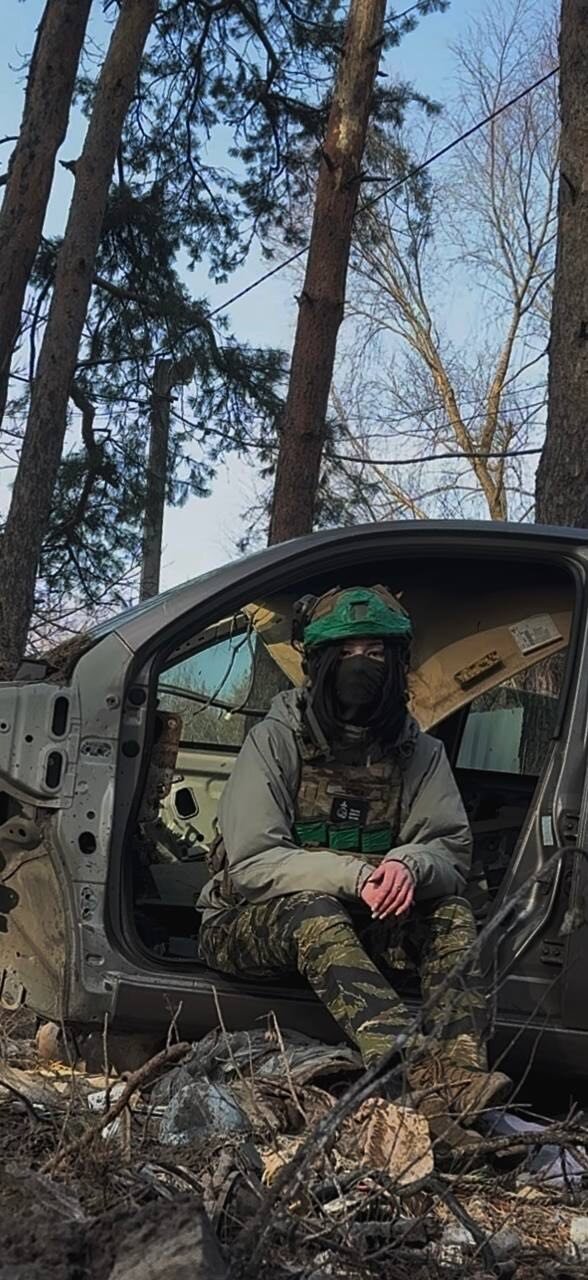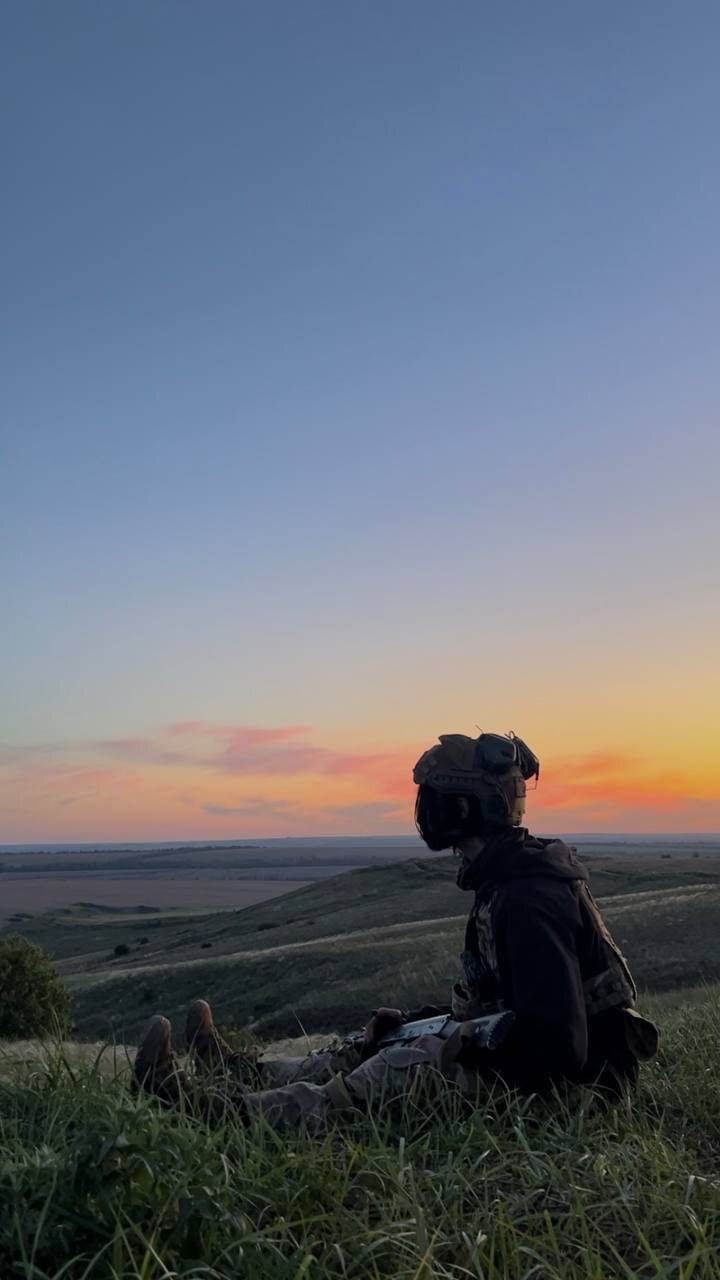FPV drone operator Yeva: "I don’t understand how draft dodgers can live in constant fear that someone will catch and mobilize them"
When the full-scale war began, Yeva was still in school. At the age of 18, she signed a contract and set out to destroy the enemy. She has spent a year and a half in the combat zone. She serves as an FPV drone operator in the "Rubizh" Brigade. Her call sign is Yunha. She was recently concussed while heading to a frontline position. While she is undergoing treatment, we had the opportunity to speak with her and record this interview.
- Why did you decide to go to war?
- From the very beginning, I knew that once I turned 18, I wouldn’t stay on the sidelines of what was happening. I didn’t want to wait for the war to reach my home. So it was a conscious decision. I knew exactly where I was going and why. I chose to serve in the Rubizh Brigade because I trusted the people there. I had heard enough about their work and professionalism.
- Did you talk to your peers about your plans? How did they react?
- I’m from Uzhhorod, and around here, there wasn’t a clear understanding that something terrible and frightening was happening. Because of where we lived and our age, we didn’t see the war. So when I said I would sign a contract at 18, no one took it seriously.
- What was the reaction of your parents?
- They still don’t fully understand my choice, because they care about me, they worry, and they’re anxious — I’m almost always in the combat zone. And I completely understand why they feel that way. But even so, they support me however they can. And that means a lot to me.
- Why did you choose to become a drone operator?
- I can’t say I exactly chose it (smiles – О.М.). But before signing the contract, I already knew that FPV drones currently have the highest efficiency, that they really help our infantry and the military overall on the front line. That’s why I decided to do it.
- What was the training like?
- Standard — just like everyone else’s. But the real training starts when you're out there, working in positions. The dynamic is completely different there (smiles – О.М.). Both physically and mentally.
- What was it like when you flew a drone for the first time?
- The first time, of course, was at the training ground. We trained a lot — and we still do — because you always need to improve your skills. When you’re working every day, you have to level up. The enemy is doing the same. And we need to be better than them.
But during my first combat flight, my biggest fear was that I would miss the target and fail to do my job properly. But it worked out! Everything went well and in a coordinated way. Because I have a great team that I go out to positions with. And that really matters, because your life depends on the people you work with.
- Absolutely! We’ll talk more about your team later. Tell me, where was your first combat mission?
- Bakhmut direction. The first flights were mostly to establish a connection and get a feel for how everything worked. This was our team’s first deployment specifically with FPV drones, so we had to take everything into account and get the job done. And we did — just as we planned. We carried it out pretty well.
- What did you destroy then?
- During the first deployments, we targeted enemy infantry. That’s a shorter range and makes it easier to locate enemy positions. Later, we started working at longer distances, hitting artillery and equipment.
- Some drone pilots keep track of their confirmed hits. Do you?
- We don’t really do that. We work a lot and go out often, so it’s hard to count every single target.
But I do save photos and videos of destroyed equipment or ammo depot hits — especially when it goes up in flames nicely (smiles - O.M.).
- Is there a particular target you dream of hitting? The commander of the K-2 Battalion's strike drone platoon, Leila, told me her dream target is the Solntsepok. She saw one, but unfortunately didn’t have time to launch.
- Most likely, I even know the situation you’re talking about — I was in a similar one. My dream is to help our infantry as much as possible and inflict the greatest possible damage on the enemy. So I can’t say that I have one specific gun I’m prioritizing. What matters most is helping our own and being effective.
- How do you deal with fear? How do you prepare before a mission?
- For me, the biggest fear is not doing my job well. Maybe it’s because of my age or other factors, but I don’t panic. Even during my first deployment, all I cared about was doing everything right. But when everyone feels afraid — that’s completely normal. You just have to pull yourself together and switch on your self-control. Everyone handles it differently. It depends on the person.
- You see the enemy on the monitor. What do you think about them?
- First and foremost, that’s my target. So I don’t think about them personally. I focus on how to reach them as fast as possible and hit as precisely as I can — that’s it.
- Do you feel any emotions toward the Russians in those moments? Like anger or hatred?
- What really brings me satisfaction is when we destroy high-value targets, like large artillery pieces. I know from experience how unpleasant it is when something like that hits near you.
When you take out equipment that’s firing directly at you, it brings really good emotions. And when you’re working against infantry — chasing someone down and hitting them — it brings a sense of joy.
- You said you know what it’s like to be under fire. What happened to you?
- While we were heading to a position, our vehicle was hit by an FPV drone. We were lucky — no one got seriously injured. I suffered a concussion. For the first time in a long while, I’m not on the frontline because I was in the hospital. The guys are also undergoing treatment. So our crew has been out of action for a bit. But we’ll be back soon — with some "gifts" for the enemy (smiles – O.M.).
- Wishing all of you a quick recovery! Was it an ambush?
- Most likely.
- Were you using EW (electronic warfare)?
- Yes. But the drone may have been operating on different frequencies or something else. Technology is advancing really fast. Every action has a counteraction. Just like we come up with something new, so does the enemy.
- How has the situation in the sky changed since you started fighting?
- It’s gotten more difficult. The enemy is developing countermeasures. Even a year ago, flights were easier — there weren’t so many EW systems, and it was faster to establish a connection. But we’re also doing a lot to make it harder for the enemy to hit us.
- The commander of the "Dronho" strike UAV group, Chaplain, told me that Russians don’t count drones — they throw them around like stones…
- That’s exactly right. Unfortunately, the Russians have huge resources. They don’t count people, equipment, or drones. They can locate a position and spend everything they’ve got at that moment on a single dugout.
- What does such careless use of their own resources mean?
- First of all, it tells me they’re b#stards. Sorry, but there’s no other way to put it. They don’t even care about their own infantry. They send waves of soldiers into open fields like cannon fodder. On the one hand, that makes them easier to take out. On the other hand it’s a problem. Because their resources are bigger than ours.
- Which they are also constantly replenishing...
- The main thing is that we have enough drones for everyone (smiles – O.M.). I think there will be enough for everyone.
- How’s your supply situation, by the way? Has it gotten any better?
- It has. But you can never have too many drones. There’s enough for every Russian, but we’ll take more, please (smiles – O.M.).
- I know your unit doesn’t have a set rotation length—you’ve stayed in position for up to two weeks at a time. What’s the longest you’ve been out there?
- About two weeks, actually. That was at Makiivka.
- What did you manage to accomplish there?
- A lot. We destroyed several mortars — there were plenty of them in that sector, and they were causing real damage. Plus, the enemy was actively assaulting, and we were actively eliminating them.
- When you're out at positions for a long time, it's obviously exhausting. How do you try to get at least some proper rest or sleep in those conditions?
- Getting proper sleep is the hardest part. We rotate so someone from the crew can rest a bit. But there are moments when you sleep for ten minutes, and then they wake you up because it’s time to get in the air. That’s normal. One day we’ll all get to rest. But the enemy needs to be destroyed today. Unfortunately, this is war. Of course, I can feel the fatigue building up — and it narrows all your desires down to the basics: sleep, have a good meal, and sleep again.
- What’s the longest you’ve gone without sleep?
- I honestly can’t say. Out at positions, the days just blur together. You don’t even pay attention to when you last slept. Sometimes you don’t know what day of the week it is or what time it is.
- How do you stay awake during moments like that? People often drink coffee to keep going.
- I love White Monster (energy drink – O.M.). It’s my only bad habit — but I’d take someone down for it (laughs – O.M.)
- Where do you get it? Do volunteers bring it?
- I buy it when I get the chance. When you come back from a position, you’ve got a bit of time to wash up, get some sleep, go out and shop. Then you start preparing everything you need for the next deployment. It’s not like you’re really resting the whole time here. Even when you're off the line, there's always work to do.
- Have you ever heard the phrase "War isn’t a woman’s business" directed at you?
- When I first came in to sign the contract — yes. Those stereotypes exist, and that’s okay. Especially at the beginning. Plus, considering I signed the contract at 18, people saw me not even as a woman, but more like a kid. And that’s also totally fine. But later, when you prove yourself through your work and clearly do your job, there’s no need to fight for your place (smiles– О.М.). It comes on its own.
- Your fellow FPV operator, Yana Zalevska, believes that there is sexism in the army. Have you experienced that yourself?
- I haven’t encountered any direct sexism. I think a lot depends on how you present yourself. If, for example, you can respond to inappropriate jokes sharply but politely, they stop. It really all comes from the team. Everyone understands that when we’re off the line, there’s a woman around who might need a bit more time to shower, dry her hair, and so on. And that’s treated as completely normal. But on positions, I’m not a woman first — I’m a soldier. I’m here to do my job.
- Are there any additional rules within your team?
- The guys understand that I can’t carry as much weight as they can. So when we’re hauling ammunition, of course, I take less. I’ll put it this way: every team has its flaws. And that has nothing to do with gender — it’s about physical and mental qualities. We need to complement each other. So everyone needs to do their part.
- The Unmanned Systems Forces recently announced recruitment for the "Harpies" unit, where all drone operators will be women. Would you want to serve in a crew like that?
- For me, what matters is that a person does their job well. I don’t care about their gender, age, or what they did in civilian life.
- In one of your interviews, you said: "When I’m on a position, no one has an issue with my work or the fact that I’m a woman. The only complaints I hear come from people sitting somewhere safe, far away from combat." Can you give an example?
- We were in a store. Some man — unfortunately, also a serviceman — looked at me and said: "Where do they even find women like that for the army, and why take them at all?" My brothers-in-arms explained to him, quite clearly, that I had just come back from a position where I’d successfully done my job.
I also get comments on social media. Often from men who aren’t even in Ukraine. And it’s exactly from them that I hear the most negative things said about me.
- How do you take it?
- I don’t take it personally. There’s already enough negativity in life. I’m not going to justify myself or prove anything to anyone, and I don’t see the point. Honestly, they should just be mobilized (smiles – О.М.). Guys like that don’t need replies in the comments — they need draft notices, and that`s it.
- If you were to reply to them, you could say something like: "Then come and take my place at the position!"
- It makes sense (smiles – O.M.). So, to return to the statement that war is not for women, but it is because of men like this that they go to war.
- Then I have to ask: how do you feel about draft dodgers in Ukraine who are hiding from the TCR (Territorial Center of Recruitment and Social Support)? What do you think about them?
- First of all, I don’t understand how they can live in constant fear that someone will catch and mobilize them, afraid to even leave their homes. Second, with the way things are at the front right now, their efforts and help would be much more useful in combat than on a couch.
- If they’re too scared to step outside, what can you expect from them on the front line?
- You see, they think they’ll be thrown straight into the infantry and immediately come under constant fire. They don’t realize there’s a shortage of people even for rear positions. The number of personnel keeps shrinking. There’s work to be done off the line, and right now, there’s no one to do it.
- Do you ever get to go home?
- Very rarely. I’ve been on the front line almost non-stop since I was 18. Leave is infrequent and short, which makes sense, considering the situation at the front. Still, I want to see my family too. The last time I was home was a couple of months ago. But there’s never enough time to deal with everything in civilian life. I’m also a student — I’m enrolled at a university. Sometimes I need to show up there as well.
- From what you’ve seen, has the rear changed recently?
- I think there’s already a noticeable shift toward a negative attitude toward soldiers. People are starting to see them as aggressive or unstable. That’s not good. People don’t understand that the only reason they can go to stores, parties, or visit friends is because someone else is sitting in a trench at that very moment.
- Do you wear your uniform in the rear?
- No. It should stay at work. Doctors don’t walk around the streets in their white coats either (smiles – О.М.). Besides, when I’m on leave, I want to wear a dress and look feminine, not like a soldier.
- What do you miss most from civilian life?
- My loved ones. We see each other very rarely. I’d love to spend more time with my family and friends. Family is one of the most important things in life.
- I heard you plan to stay in the military after the war. Why is that?
- I’ve already signed my second contract. I don’t see myself in civilian life. I’m doing what one should be doing. I want to become a top specialist in what I do. And after the war — move up the career ladder and prepare for the next one.
- Do you think that after this war ends, the Russians might attack again at some point?
- That’s possible. That’s why we can never afford to let our guard down. We need to keep training and preparing for the next war.
- How would you explain this to people who believe that former U.S. President Donald Trump is about to pressure Russia into peace, and that nothing will threaten us after that?
-Trump already "ended" the war in 24 hours when he first took office (smiles – О.М.). Sometimes military personnel get criticized for giving interviews. But I believe we actually should be speaking out in the media and on social networks — to show what’s really happening at the front. Especially now, when the enemy is actively advancing and has no intention of stopping. Because I still see people who don’t understand what’s going on in our country. It’s been three years of full-scale war, and some are still partying to Russian music. That has to change.
Olha Moskaliuk, Censor.NET
Photos and video provided by the interviewee


